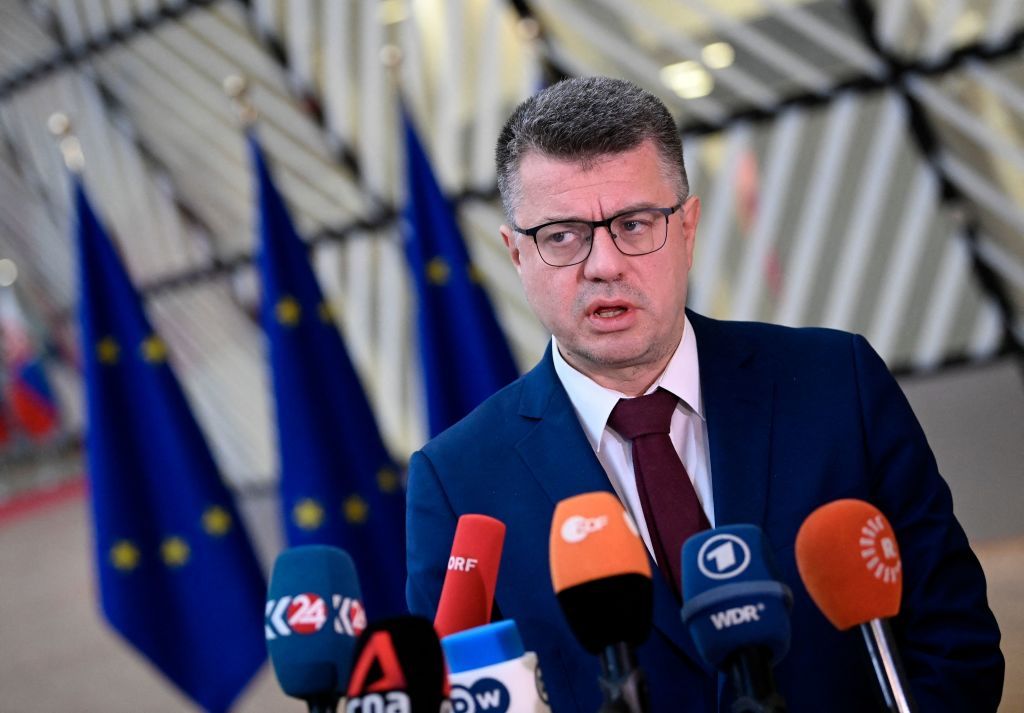Ukraine war latest: Zelensky calls for rapid delivery of weapons, meets Estonian PM

Key developments on April 24:
- Zelensky calls on Western allies to speed up delivery of weapons and ammunition
- Estonian PM visits Zelensky, agrees to help Ukraine draw closer to NATO membership
- Lavrov addresses UN Security Council in New York, UN says a possibility of conflict between global powers at ‘historic high’
- Guterres criticizes Russia’s war for causing mass suffering in Ukraine
President Volodymyr Zelensky on April 24 called on Western allies to speed up their delivery of weapons and ammunition, emphasizing that it is crucial in protecting the lives of Ukrainians.
Zelensky’s statement comes shortly after his meeting with the visiting Estonian Prime Minister Kaja Kallas, with whom he says he discussed certain EU nations' incompleted promises to supply weapons and ammunition to Ukraine.
“People's lives directly depend on the speed of delivery and the implementation of decisions that have already been made,” Zelensky said in his evening address.
At the joint press conference, Zelensky thanked Estonia’s substantial support for Ukraine, stressing that the Baltic nation’s aid is one of the largest in the world in terms of per capita.
“If each of the leaders and each of the states were just as conscientious in protecting our common freedom on the continent, Russia’s aggression would already have suffered an obvious defeat,” Zelensky said at the press conference.
Kallas, who spent the day with Zelensky in the northwestern region of Zhytomyr, agreed to work together to draw Ukraine closer to accession ahead of the July NATO summit in Vilnius so it can become a member “as soon as conditions allow,” a joint declaration said.
"We agree that a strong, independent and prosperous Ukraine, as part of the Euro-Atlantic family and as a member of the EU and NATO, is essential for the future of European security," the joint declaration reads.
To the east of the country, some of the fiercest battles of the nine-year-old war rage on.
In an interview published on April 23, Zelensky reiterated that defending Bakhmut, a largely-destroyed city in Donetsk Oblast that endured heavy fighting since last summer, is still strategically important.
Speaking to Al Arabiya, Zelensky rejected some experts’ claims that Bakhmut holds little strategic value, offering them to make a visit “so that they can understand what could happen and what the threats are.”
“It is impossible for us to give up on Bakhmut because this will (help) expand the battlefront and will give the Russian forces and Wagner (mercenary group) chances to seize more of our lands.”
Wagner Chief Yevgeny Prigozhin on April 24 claimed that his mercenaries made some gains in the northwest of Bakhmut and were advancing toward the city’s western flank.

Russia at the UN
Russia’s Foreign Minister Sergey Lavrov on April 24 travelled to New York and addressed the UN Security Council, headed by Russia this month.
In his speech, Lavrov said that Russia would continue waging its war against Ukraine due to what it views as threats from NATO and Kyiv, repeating a widespread narrative by the Kremlin.
Lavrov said the world was “possibly” at a more dangerous threshold than during the Cold War due to what he blamed were the results of the West’s harsh sanctions imposed against Moscow and “the rejection of diplomacy.”
“The situation is worsened with the loss of trust in multilateralism,” Lavrov said during the speech.
Many countries in the West cut diplomatic ties with Russia over the February 2022 full-scale invasion and have unleashed rounds of sanctions to deprive Moscow of the financial capability to continue its war.
The tensions between the U.S. and Russia heightened in late March, when a U.S. reporter Evan Gershkovich was detained in the city of Yekaterinburg for an alleged espionage charge, which his employer, The Wall Street Journal, and the U.S. government deny. It is the first time since the Cold War that Russia detained an accredited American journalist.
At the same April 24 meeting, U.N. Secretary-General Antonio Guterres, seated next to Lavrov, reiterated that Russia is "causing massive suffering and devastation to Ukraine and its people” and warned of the heightening tensions between Russia and the West.
"Tensions between major powers are at a historic high. So are the risks of conflict, through misadventure or miscalculation," Guterres said, addressing the 15-member Security Council.
Despite backlash from Kyiv, Russia, one of the five permanent members of the UN Security Council, holds a rotating presidency in April.













